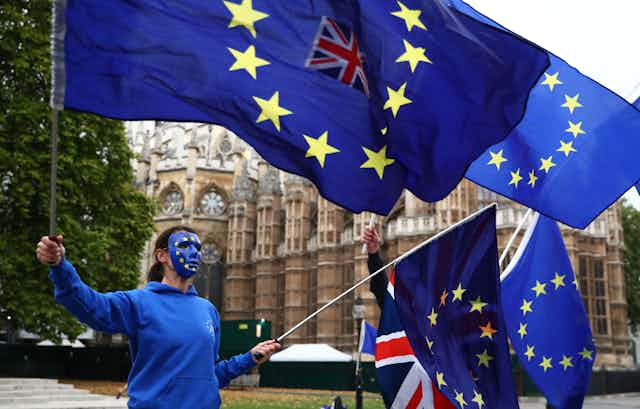Around 5m European citizens affected by the outcome of the UK referendum (EU citizens in the UK, and British citizens in the EU) have been living in a state of uncertainty for more than 500 days.
Months on from the EU referendum, they have had little, if any, reassurance about their right to stay and work in the UK and the EU after Brexit.
Many in the UK have reacted by seeking permanent residence status. This process now has a failure rate of 28% and an average waiting time of 116 days.
The government has announced that EU citizens and family members will have to apply to the Home Office to get a new “settled status”. Those who have already obtained “permanent residence” will need to apply again (though via a simplified process).
Some citizens are precluded from obtaining either status. Women with young children who take time out of work to look after them, for example, don’t qualify.
Those who may have initially satisfied the five-year continuous residence requirement, but were subsequently away from the country for long periods of time, will need to start from scratch.
Others who have arrived in the UK after March 29 2017 are also living with the threat that they might not be able to stay at all after Brexit day, thanks to the lack of clarity about the UK government’s plans for them, particularly with regards to the cut-off date.
Meanwhile, a record number have decided to simply leave the UK.
Bargaining chips
The start of the negotiations in May 2017, paradoxically made things worse. Key rights became the subject of a bargaining exercise. EU citizens in the UK can now no longer be sure that they will be able to bring family members to live with them after Brexit or that they will retain their “settled status” after spending two years away from the country. UK citizens in the EU no longer know if they will be able to move freely across the EU27 member states, though many of them may be currently living in one state and working in another. Their fundamental right to respect for their private and family life became commodities in the negotiation.
The quid-pro-quo operation is often glossed as an exercise in pragmatism. Both the UK and EU deny that they are treating citizens as bargaining chips. According to the UK’s Brexit secretary, David Davis:
We are trying to find on both sides I think, pragmatic solutions. In the fourth round we offered the guaranteed right of return for settled citizens in the UK in exchange for onward movement rights for British citizens currently living in the EU.
“It can hardly get more bargaining-chippy,” one academic quickly noted on Twitter.
The result of all this is continuing anxiety around citizens’ rights. This affects their personal, social and economic relations, as evidenced, for instance, in a report submitted by the New Europeans civil rights organisation to the European parliament. I was present at the European parliament hearing when chief negotiator Guy Verhofstadt explained that he had received somewhere between 6,000 and 7,000 emails and letters from UK and EU citizens describing how they had been personally affected by the insecurity surrounding Brexit.
The threat of a “no deal” must also be seen as an aggravating factor. If the protection of rights depends entirely on reaching a deal, the state of precariousness will continue for as long as negotiations continue.
Human rights
With the sixth round of the Brexit negotiations soon to start, now is the time for the UK government and the EU27 to put an end to this sorry state of affairs. They could be acting in breach of international human rights law unless they do so, now.
I made this claim when I appeared before the House of Lords’ EU Justice Sub-Committee. There, I explained that uncertainty in itself could result in applications to the European Court of Human Rights under Article 8 of the European Convention on Human Rights (ECHR) on the right to a private and family life, in line with existing case law coming from Strasbourg. For example, the court has found that, where the uncertainty and precariousness of an individual’s situation affects the network of his or her personal, social and economic relations, which make up his or her private life, there can be an infringement of Article 8. The European Court of Human Rights also warns that states should ensure that a situation of insecurity like this should be as short-lived as possible.

There is ample evidence from EU and UK citizens that the precarious and uncertain state of affairs, caused by the UK and the EU27’s inability to secure existing rights, has already had important consequences for them – in both material and psychological terms. It has affected their personal, social and economic relations, in a way that may constitute sufficient basis for legitimately calling upon the European Court of Human Rights to intervene.
Whether applications to Strasbourg would be successful would depend, of course, on the specific circumstances of cases reaching the court. The UK’s relationship with the European Court of Human Rights is currently evolving within a wider political – often polemical – context, which might also influence the outcome. The Strasbourg court might opt to defer to domestic authorities to avoid further tension with the UK over its threats to withdraw from the European Convention.
But the political context argument cuts both ways. Faced with the dire prospect of 5m people living in limbo, the court might be strongly inclined to intervene, to actively protect their fundamental human right to private and family life and safeguard a core element of the European architecture of human rights. This is supposing that an application reaches it in good time of course.
I must add here that analysis of Strasbourg case law leaves little doubt that if EU citizens were subject to forced deportation from the UK, that act would trigger Article 8 of the ECHR.
In view of the above, the failure to secure the rights of European citizens remains a troubling oxymoron. Negotiations over the right to stay are ongoing, even though there is a right to stay under ECHR law (people cannot be deported), and prolonged uncertainty in itself may violate Article 8 of the ECHR.
In other words, citizens’ rights are non-negotiable. It’s high time that the UK and EU27 recognised this, and offered unilateral guarantees enabling EU citizens in the UK and UK citizens in the EU to continue to exercise the same rights as before, in accordance with international human rights law

